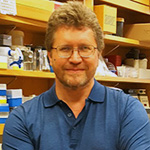 Professor and Vice Chair of Research
Professor and Vice Chair of Research
Research Areas
DNA replication and cell cycle progression in eukaryotes
Biography
Igor Chesnokov received his Ph.D. degree in Biochemistry at Leningrad (St. Petersburg) State University (Russia). He did his post-doctoral work at the University of California in Berkeley and Davis. He joined the department of Biochemistry and Molecular Genetics at UAB in 2002.
Research Interests
Our laboratory studies the molecular mechanisms of DNA replication and cell cycle progression in eukaryotes. DNA replication in eukaryotes is a highly conserved process that begins with the binding of the six-subunit origin recognition complex (ORC) to the origins of DNA replication. ORC binds to origin sites and helps recruit additional initiation factors to form pre-replicative complex (pre-RC) thus ‘licensing’ origin for replication. Many studies indicate that the functions of ORC extend beyond DNA replication. Some of these activities link DNA replication to cell cycle progression, whereas other functions seem distinct from replication. How ORC accurately executes its multiple roles during normal cell cycle and in disease, remain long-standing question in the field.
The smallest of ORC subunits, Orc6 protein, is important for DNA replication in all eukaryotes. We have shown that in Drosophila Orc6 has an additional role in cytokinesis through interaction with the septin complex, a highly conserved polymerizing protein assembly that is critical for cytokinesis in many species and is recognized as important component of the cytoskeleton. We have identified structural features of Orc6 that contribute directly to the functions of the protein in replication and cytokinesis. In collaboration with other groups, we have established that mutations of Orc6, which perturb its association with core ORC, result in a Meier-Gorlin syndrome (MGS) in humans, an autosomal recessive disorder characterized by microtia, primordial dwarfism and skeletal abnormalities. Thus, understanding the diverse molecular functions of Orc6 is critical to determining its multiple roles in the cell. Our goal is to characterize the mechanism of ORC functions in DNA replication and cytokinesis. The research projects in our laboratory include: 1) Determination of structural features of ORC critical to its functions; 2) Establishing Drosophila model systems to analyze naturally occurring and structure-guided targeted mutations of human ORC proteins in vivo; 3) Understanding the molecular mechanisms of septin functions in the cell; 4) Defining the role of Orc6 in septin polymerization and cytokinesis.
For our studies we use Drosophila as a model system as well as mammalian cell lines. An understanding of the molecular events involved in the initiation of replication and cytokinesis will provide a basis for ultimately controlling these processes. Such control might lead to rationally designed therapies for cancer and may provide the means for regenerating cells lost due to aging, disease or injury.
Education
Graduate School
Ph.D., Leningrad (St. Petersburg) State University, St. Petersburg, Russia
Postdoctoral Fellowship
University of California, Davis
University of California, Berkeley
Contact
Office
Kaul Human Genetics Building
Room 552A
720 20th Street South
Birmingham, AL 35294-0024
Phone
(205) 934-6974
Email
ichesnokov@uab.edu